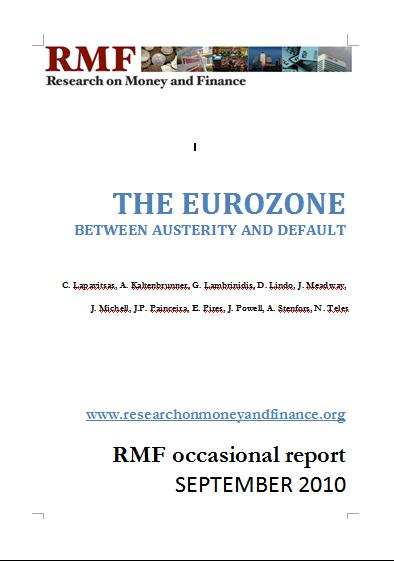Call for an audit commission on Greek public debt
apr 15th, 2011 | Di Costanzo Preve | Categoria: Politica Internazionaledi Costanzo Preve
Invito tutti i lettori a sottoscrivere l’appello che segue, dopo aver letto il breve abstract che trovate qui. A questo indirizzo, invece, trovate il documento completo. Saluto con affetto Anna Kokkali e tutti gli amici greci.
—
 We the undersigned believe that there is a pressing need for an Audit Commission to examine Greek public debt. Current EU and IMF policy to deal with public debt has entailed major social costs for Greece. Consequently, the Greek people have a democratic right to demand full information on public and publicly-guaranteed debt.
We the undersigned believe that there is a pressing need for an Audit Commission to examine Greek public debt. Current EU and IMF policy to deal with public debt has entailed major social costs for Greece. Consequently, the Greek people have a democratic right to demand full information on public and publicly-guaranteed debt.
The aim of the Commission will be to ascertain why public debt was incurred, the terms on which it was contracted, and the uses to which borrowed funds were put. On the basis of these considerations, the Commission will make appropriate recommendations to deal with debt, including debt that is shown to be illegal, illegitimate or odious. The purpose of the Commission will be to help Greece take all necessary measures to confront the burden of debt. The Commission will also seek to find who was responsible for problematic debt agreements.
Public and private debt is at the heart of the Eurozone crisis. The global crisis that began in 2007 took the form of a debt crisis of the periphery of the Eurozone. According to the latest government budget, Greek public debt is expected to rise from 299 billion euro (or 127% of GDP) in 2009 to 362 billion euro (or 159% of GDP) in 2011. The increase in public debt has heightened the danger of national default in the periphery of the Eurozone and raised the possibility of bank failure across Europe. The EU, in conjunction with national governments, has responded through rescue programmes that have facilitated temporary borrowing by Eurozone states and protected banks. But these measures have failed to calm financial markets and, as a result, borrowing rates have continued to rise for peripheral countries. Furthermore, the price of the programmes has been austerity. Greece, Ireland and other countries were forced to cut wages and pensions, contract public expenditure, shrink welfare provision, privatise public enterprises, and deregulate markets. Further social costs are inevitable due to higher unemployment, business failures and loss of output.
Greece has been at the forefront of EU rescue programmes, but the Greek people have been kept in the dark regarding the composition and terms of public debt. The lack of information represents a fundamental failure of the democratic process. The people who are called upon to bear the costs of EU programmes have a democratic right to receive full information on public debt.
An Audit Commission can begin to redress this deficiency. It can also encourage the active participation of broader layers of society in movements that tackle the problem of public debt. The Commission will be international, comprising debt and fiscal auditors, legal experts, economists, representatives of labour organisations, and participants from civil society groups. It will be independent of political parties, though it will not exclude politicians from membership provided that they accept its aims. The Commission will ensure possession of expert knowledge, while guaranteeing democratic accountability and control over all involved.
To achieve its aim the Commission ought to have full access to public debt agreements and debt issues over time, including bond issues, bilateral, multilateral, and other forms of debt and state liabilities. It ought to have requisite powers to place at its disposal all documents that it judges necessary to complete its work. It is also necessary to instigate appropriate procedures that would allow the Commission to call public functionaries to give evidence, as well as to examine, after a reasoned request and judicial support, bank accounts, particularly public accounts with private banks and with the Bank of Greece. Finally, a sufficient period of time ought to be made available to it to examine debt agreements and produce its report.
The case for an independent and international Audit Commission to examine Greek public debt is unanswerable. The Commission is also a democratic demand of the Greek people who are bearing the burden of the crisis and want to know its causes. In all respects an Audit Commission for Greece could act as prototype for other countries of the Eurozone.
http://www.gopetition.com/petition/43171.html
